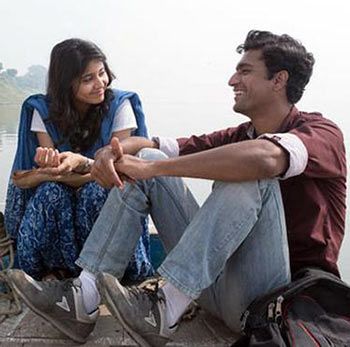 'I may sound snobbish but I am genuinely tired of responding and saying thank you on Facebook, on Twitter, on phone calls. People are calling from everywhere.'
'I may sound snobbish but I am genuinely tired of responding and saying thank you on Facebook, on Twitter, on phone calls. People are calling from everywhere.'
'There is all this excitement and different groups are throwing parties. I have to attend them or else they will think I am snooty.'
Meet Masaan director Neeraj Ghaywan.
From a marketing manager to directing Masaan, Neeraj Ghaywan has come a long way.
Masaan recently bagged two top awards at the recent Cannes International Film Festival.
In the picture: Shweta Tripathi and Vicky Kaushal in Masaan
Ghaywan is still reeling from the unexpected wins, and finds it tough to keep up with his newfound fame.
He tells Patcy N/Rediff.com how Masaan found its wings.
Congratulations on your double win at Cannes! How does it feel?
Last year I won the Sundance Institute/Mahindra Global Filmmaking for Masaan (Fly Away Solo) and this year my film got two awards at Cannes (the FIPRESCI Prize and the Most Promising Newcomer award).
I feel so happy, not only for me, but for my country and my team.
This was long overdue for India. The last film that won in the official selection in Cannes was in 1999 (Malayalam film Marana Simhasanam, directed by Murali, was screened in the Un Certain Regard section at the 1999 Cannes Film Festival where it won the Caméra d'Or).
I am really happy for all the champions of Indie filmmakers like Anurag Kashyap, Vikramaditya Motwane, Guneet Monga and now Manish Mundra (co-producers of Masaan).
These people have been fighting for so long against the conventional stream of Bollywood, against the shortage of resources and shortage of support from everywhere.
This award is recognition for the kind of work that they have been doing; this is an acknowledgement for them.
When you were filling the form to send your movie to Cannes, did you anticipate this win?
No, not at all!
My writer Varun Grover and I thought we should make a film that we are honest about and that we will be happy to show to people.
We were just striving to make a good film and had no expectations whatsoever. Even getting the film in the Un Certain Regard section was a big thing for me.
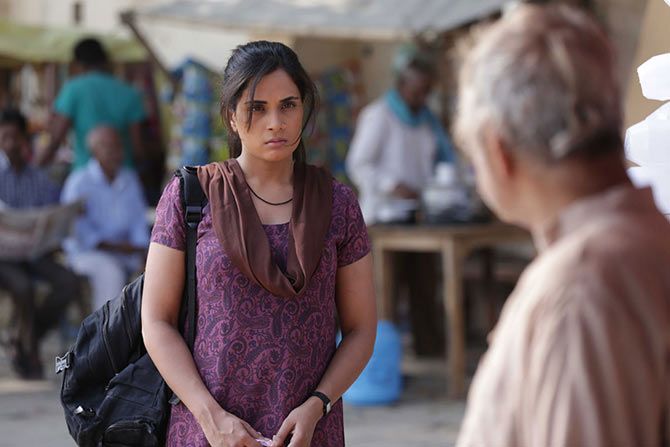
You got a five-minute standing ovation. What was going through your mind then?
When the applause started, I blanked out.
The theatre was huge. It had two floors and it was a full house.
Suddenly the clapping became a roar. I got up and looked at my team. After that, I don't know what happened.
I started crying. I wanted to slap myself. I have seen many people cry on stage and I used to think, where is the need to cry? And here, I was doing the same thing.
I felt so silly, but I just couldn't control myself.
Richa Chadda and Manish Mundra also started crying. Dipa De Motwane (Vikramaditya Motwane's mother and co-producer of Masaan), the mother of my film, started crying.
It was a very emotional moment.
Tell us about the awards ceremony.
After the film screenings, the team left. Only a couple of French producers and I were still there.
We were invited for the awards ceremony and when we went there, we learnt that we had won.
Then we got another invite and we were thinking, have we won another award? I thought I should not expect too much. But then we got the Most Promising Newcomer award.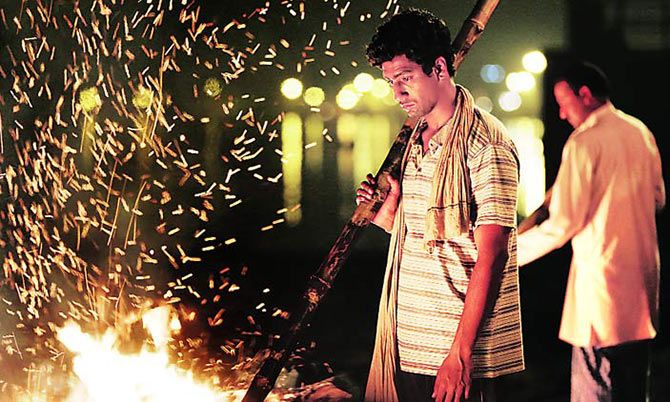
What kind of compliments have you been getting?
I may sound snobbish but I am genuinely tired of responding and saying thank you on Facebook, on Twitter, on phone calls. People are calling from everywhere.
And in between all this, I am also working on Masaan, for its Indian release on July 24. We are adding a couple of scenes.
Plus, there is trailer work.
There is all this excitement and different groups are throwing parties. I have to attend them or else they will think I am snooty.
It gets very difficult with so many Twitter mentions and mails in my inbox.
How did the idea of making Masaan come to you in the first place?
Masaan literally means large cremation grounds like Manikarnika Ghat and Harish Chandra Ghat in Benaras. The word 'masaan' is used in Benaras.
In the film, metaphorically, it means the circle of life, that is, the transition from one point to another. For us, it is about that transformation.
The idea for the film came to me a long time ago when I was in my corporate life in Delhi.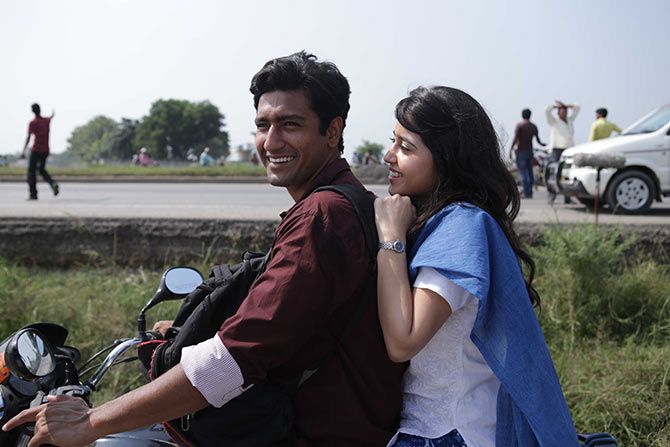
What were you doing before films?
I was a marketing manager. I got my Engineering degree and then MBA.
While doing my MBA, I did a short film course.
I watched lots of movies but this course made me understand cinema from the critic's point of view. That's how my interest grew. I started watching films of great directors of world cinema.
There was a website called Passion for Cinema. I met Anurag (Kashyap) and other filmmakers on that platform. We were all jamming there and that increased my interest in wanting to make such films.
I started reading and writing about films. I have written lots of reviews of world cinema on Passion for Cinema. But since that blog doesn't exist any more, I have those reviews on my personal blog now.
I was marketing manager for Mahindra's and then shifted to Hindustan Times. I had a good pay package and my parents were very proud of me as I was the highest earning member in my family.
I thought of doing something related to film marketing but that didn't happen.
Then I joined a new media company -- Anurag had introduced me to the people there. But I was not doing what I wanted to do. I started questioning myself about whether I had taken the right decision as I was not enjoying my work.
Anurag called me when he was writing Gangs Of Wasseypur. I told him I was not enjoying my work and I was crying every day.
He told me: 'If you are so passionate about films, jump into it.'
He offered me work on GOW. I was in my office when I was talking to him. I immediately wrote my resignation letter.
My parents were very upset. They didn't speak to me for seven months. Now they have come around.
GOW was my film school.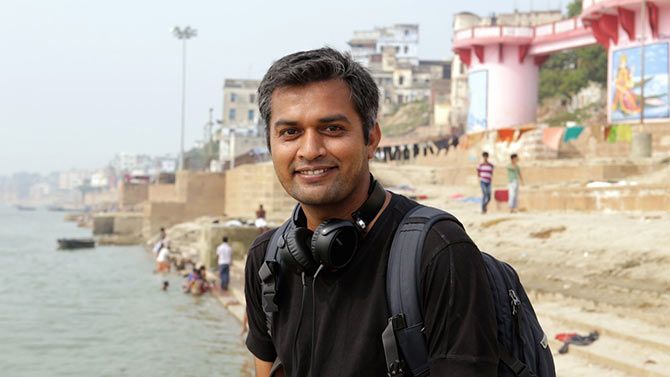
What did you do next?
I had heard about these ghats in Benaras from a colleague in my office.
I was fascinated by the people who work on these ghats, burning bodies day in and day out. They don't have time to sleep. They have no emotions.
I started wondering about their lives and that interested me, but then I abandoned it. But it kept haunting me.
I started writing the draft of the script of Masaan, but it was very bad.
During this time, I also made a short film called Shor which won awards in Los Angeles, New York and London and the Satyajit Ray Award. That gave me a boost; I felt I could do it and I was not wasting my time.
I worked assisted Anurag on his film Ugly, as well as a Coca-Cola commercial. I then shot an ad, and made another short film called The Epiphany.
During this time, I met Varun Grover, the writer of Masaan. We went to Benaras and researched for 40 days. We interviewed 15 subjects a day because I wanted to write the story from their point of view.
Then Varun Grover wrote the screenplay and dialogues of the film.
How did you get a French company to co-produce your film?
I was working with Phantom (Phantom Films is a production company started by Anurag Kashyap, director Vikramaditya Motwane, producer Madhu Mantena and director Vikas Bahl).
Anurag and Vikram were my mentors, giving me inputs on the script. Dipa De Motwane helped with the budget.
The first person to come on board from outside was Manish Mundra. But we wanted more producers to make it a bigger film.
Anurag and Guneet Monga (her company Sikhya Entertainment is another of Masaan's producers) knew French producer Mélita Toscan du Plantier and Marie-Jeanne Pascal, partners in Macassar Productions.
Guneet pitched the script to them last year at Cannes and as they were starting on their own, they made it their first film.
They took the film to Arte France Cinema, the biggest finance company in France and also the biggest distribution network in Europe.
Then Pathé Productions came on board; they are the biggest chain of cinemas, like PVR in India, only bigger. All these companies came on board at the script stage.










 © 2025
© 2025